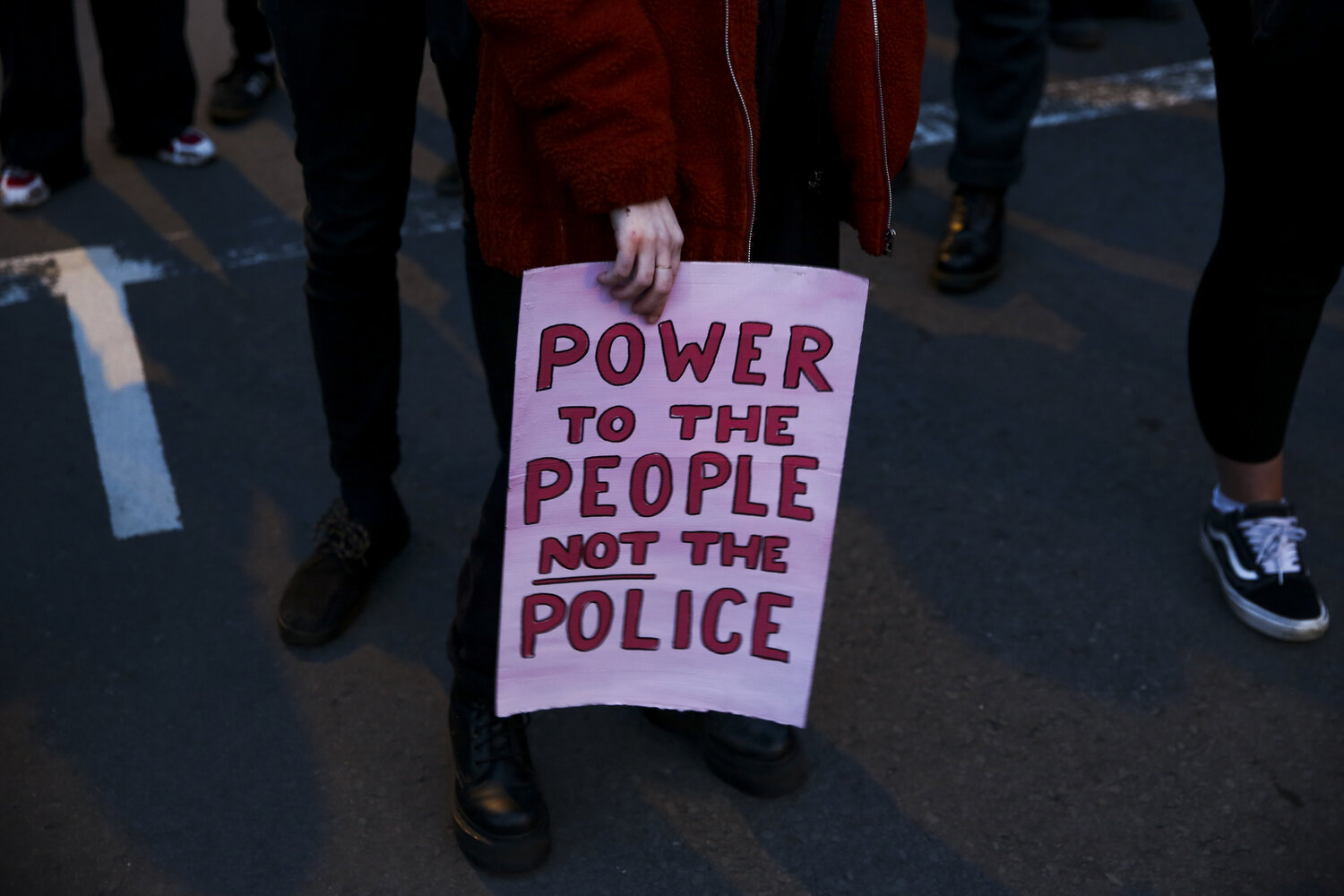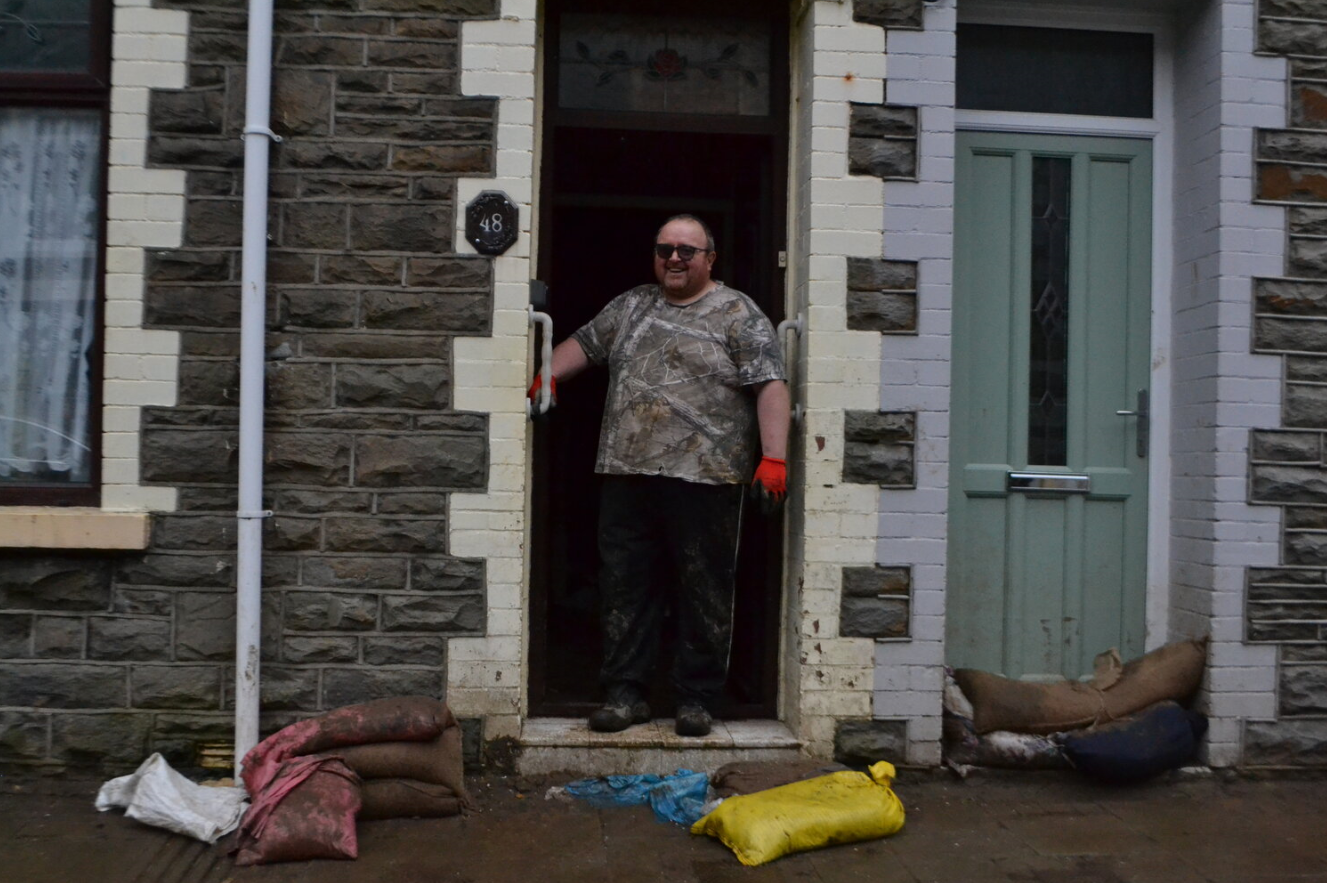
Why Are We So Scared of Defunding the Police When the Case Is Stronger Than Ever?
Photo, Tom Davies
“THE CONCEPT OF DEFUNDING THE POLICE HAS FLOATED AROUND IN ACADEMIC SPHERES FOR YEARS, BUT AFTER GEORGE FLOYD’S MURDER BY A COP IN THE US, THE CONCEPT SEEMED TO CROSS OVER TO THE PUBLIC SPHERE AND, IN PARTICULAR, SEEMED TO GATHER MORE SUPPORT IN THE UK.”
The brutal killing of Sarah Everard in March, and the arrest of a serving Metropolitan police officer on suspicion of her murder, shook society to its core. Furthermore, the heavy-handed and aggressive policing witnessed at a vigil for Sarah just days after her remains were found was further evidence of officers abusing their powers.
Unsurprisingly, the police watchdog Her Majesty’s Inspectorate of Constabulary and Fire & Rescue Services (HMICFRS) recently found that the force used at the vigil – in which women were photographed handcuffed on the ground – was “justified” due to the threat of covid-19.
Since the vigil, numerous protests have taken place in opposition to the Police and Crime bill, which would see a number of restrictions placed on protesters. The narrative pushed by the police – and facilitated by the mass media – has been that protesters were wild, violent, and out of control. Missing is the violent approach from police, who were often armed with shields, police dogs, battens, and horses.
Cardiff was quick to organise protests in the aftermath of Sarah’s death, and in the wake of the bill passing through parliament. Across Wales activists have been shedding light on Wales’ police forces after the deaths of Mohamud Hassan and Mouayed Bashir in January and February respectively, whereby both men died after coming into contact with the police – Mohamud after being in police custody, and Mouayed after being restrained at his home during what appears to have been a mental health crisis.
The imprisonment of Siyanda Mngaza, and the death of Christopher Kapessa in 2019, are another two cases that activists are drawing attention to.
In recent weeks, protests have attracted an amalgamation of people who are united in their distrust of the police, from women who endure daily sexual harassment, to victims of rape who never got their cases investigated, to young Black and Asian men and women who get stop and searched more often than their white counterparts.
The protests which have erupted since the deaths of Mohamud and Mouayed are an extension of the huge Black Lives Matter movement last year, catalysed by the death of unarmed Black man George Floyd at the hands of Minneapolis cops. It was this movement that arguably made the recent events more – or perhaps less – shocking – it’s hard to tell.
The concept of defunding the police has floated around in academic spheres for years, but after Floyd’s death, the concept seemed to cross over to the public sphere and, in particular, seemed to gather more support in the UK. However, unhelpful depictions of the theory by the tabloid media, and dismissals from not only the right but from the so-called opposition, including Labour leader Keir Starmer, painted the argument of defunding as an idealistic and instagrammable slogan rather than a concept backed up by years of academic research.
It’s unsurprising then that when a Met police officer was arrested as the sole suspect in the killing of Sarah Everard, and when women came forward to tell of their fears of walking alone at night, or the fact that many of us have been sexually harassed or cat-called more times than we can count, that politicians responded to these fears by insisting we need more officers on the streets, and revealed a pilot scheme that would see plain-clothes police officers operate undercover in night clubs to tackle violence against women.
This misses the point entirely – and completely overlooks the fact that violence against women is a wider cultural issue and a consequence of misogyny. This of course is reflected in the way in which women are told to not walk alone at night, or to not wear revealing clothing, as if this will prevent them from being raped, or, in Sarah’s case, killed.
The same can be said of institutional racism in the police, and society in general: disproportionate stop and searches, or police brutality towards Black people and people of colour, cannot be fixed by increasing the amount of ‘BAME’ police officers across the UK or rolling out ‘unconscious bias’ training. These issues run deep, and calls for reformation barely scratch the surface.
As police scholars Bayley and later Vitale point out, the police do not prevent crime, and it’s a myth that more resources and more personnel enables the police to protect society from crime. While the liberal ideal is to stamp out the bad apples and restore policing to its so-called ‘former glory’, this largely ignores the fact that, as Vitale puts it, the ‘basic institutional functions’ are left intact, and these ‘have never really been about public safety or crime control.’ These have always been more about protecting property and capital, quelling riots, protest and dissent, and controlling the working class and communities of colour.
We need to defund the police, and not only defund them because there are serious issues of systemic racism, misogyny, and abuses of power, but defund them because by doing so we can address the wider issues of society that create patterns of crime in the first place: poverty, deprivation, systemic racism, and years of austerity which have seen endless cuts to youth centres, libraries, schools, mental health services, and so forth.
Last year, the Independent reported that young people are being drawn into lifelong offending by “crimes of despair” that largely stem from poverty, trauma and discrimination. Moreover, 18 to 24-year-olds who enter the criminal justice system for minor offences such as theft, are most likely to commit more crimes, and of those who reoffend in England and Wales, over half have at least 11 convictions on their record before they turn 25.
Another interesting aspect is how we view the police in terms of their role. As Vitale explains: ‘what is missing from this liberal approach is any critical assessment of what problems the state is asking the police to solve and whether the police are really the best suited to solve them.’
A good example is mental health. Police today are not only seen as ‘law enforcement’ but have also become the first responders to mental health crises. This is due to cuts to mental health services, which means it is often left up to the police to intervene, despite them not necessarily having the appropriate level of training to do so.
In the recent case of Mouayed Bashir – which is currently being investigated by the IOPC – the 29-year-old died after officers were called to his home in Maesglas, Newport, to deal with what they described as a “medical episode.” Mouayed’s brother told the BBC how officers “forced” their way into his brother’s room, handcuffed him and “tied him up by his leg”.
Needless to say, Mouayed’s death is a tragedy and should never have happened – but why are the police responding to a ‘medical’ or mental health episode in the first place, and was the way they responded appropriate? Situations such as Mouayed’s are clearly high-risk and precarious, and the police are not equipped to deal with such situations.
Back in 2019, one woman described to the BBC how police were sent to her home five times over the course of three years when she called her local NHS mental health service out of hours. She described how police coming to your home can “be seen as quite threatening”, and that, unsurprisingly, it can often make the situation “worse.”
The concerning thing is that with the Covid-19 pandemic, mental health issues have become more widespread – with more people suffering from loneliness, depression, and anxiety, and those who were struggling before seeing their conditions exasperated. Domestic abuse has also increased, with more victims unable to escape their abusers during lockdowns. Social Care Wales reported a 49% rise in calls to the Live Fear Free helpline during lockdown period, as well as a rise in visits to their websites.
The demand has never been stronger for these services, and no amount of training in the police force will be able to plug the gap of vital charities and services.
In terms of police violence and institutional racism, it is impossible to uproot these issues within the police institution, as they are embedded so heavily in the power dynamic and their role within the state. This is so blatantly expressed in the way in which police handled women at the Sarah Everard vigil, and at the recent Kill the Bill protests in Bristol. It’s evident in the hugely disproportionate stop and search rates among Black communities.
We even see this translation of power in the way in which the mass media report protests. The police’s perspective is always prioritised, it’s always given more weight, more authority: the police are law enforcers, so how can they ever be wrong? But this has been disproven so many times. The police are not immune to crime, lies, and corruption; if anything, their uniform simply gives them something to hide behind.
Calling to defund the police is as much about calling to fund vital services as it is about taking away police funds – without these services – without mental health support, early intervention, youth services, quality housing and schools – our society will always be fractured, and no amount of police officers can stitch it back together.
A fresh ‘Defend the Right to Protest’ demonstration has been called in Cardiff on Saturday, 17th April, Bute Park Stone Circle at 2.00pm.
The writer is an editor of voice.wales and MA graduate from Cardiff University School of Journalism


The Mayhill Rioters Knew Their Future Was Bleak, Is It Any Wonder They Kicked Off? | @phased_bemused